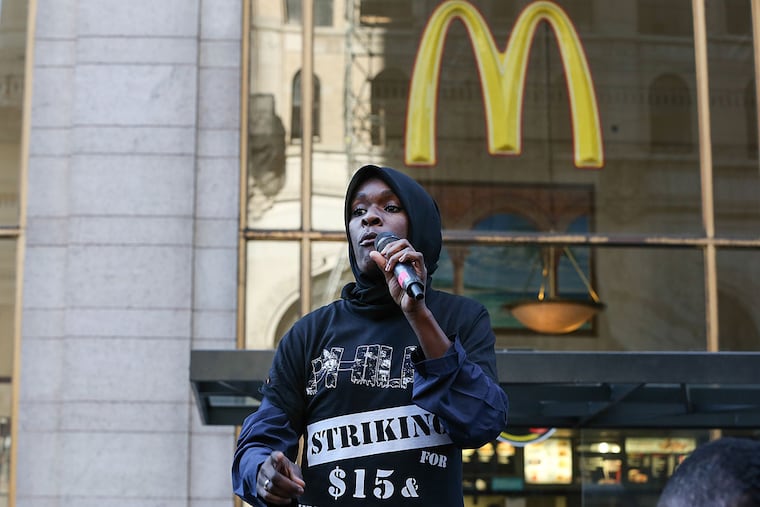Fast-food workers and others rally in Philly
It couldn't have been a nicer day for a protest Thursday, as activists - fast-food and home health workers seeking a raise, the Sierra Club, Temple students opposing a stadium, and community people against stop-and-frisk, - marched down Broad Street, banging drums, carrying banners, and shouting slogans.

It couldn't have been a nicer day for a protest Thursday, as activists - fast-food and home health workers seeking a raise, the Sierra Club, Temple students opposing a stadium, and community people against stop-and-frisk, - marched down Broad Street, banging drums, carrying banners, and shouting slogans.
"This is what democracy looks like," hundreds yelled as they walked toward the day's largest rally, at Broad and Arch Streets.
Police closed Broad Street.
Among those leading the parade was Shymara Jones, 23, of Philadelphia, a Popeyes employee who has been pushing for a $15-an-hour wage for fast-food workers since the national movement kicked off in Philadelphia two years ago.
She earns $8.25 an hour, up from $7.25, Pennsylvania's minimum wage, mirroring the national rate. New Jersey's minimum wage is $8.38 an hour.
"I got the raise the day after I went on strike two years ago," Jones said. "That's how I know we had power to the people."
Thursday's rallies and events, held all over the city, region, and nation, were part celebration, part protest.
The celebration had to do with what skeptics thought was impossible: raising the minimum wage for nearly 17 million workers throughout the nation since November 2012, when the first fast-food workers walked off their jobs in Manhattan.
Of those workers, according to a report by the National Employment Law Project, an advocacy group, nearly 10 million will receive gradual raises to $15 an hour, with many affected by state laws that raised wages in New York and California.
The increases came through government action and employers who have pledged to raise wages.
Even as fast-food workers and others held events nationwide, business and industry groups reacted.
The Employment Policies Institute, a Washington think tank that opposes raising the minimum wage, ran a full-page advertisement in USA Today on Thursday picturing fast-food patrons ordering their meals from computers.
"Meet your new crew member," the advertisement said. "No protests. No training. No problem.
"When customers reject higher prices, entry-level jobs are automated."
In Philadelphia, the Rev. Gregory Holston, speaking outside the McDonald's at Broad Street and Girard Avenue, had a different perspective.
He told the crowd that unless they fought for $15-an-hour wages and a union, employers would respond by cutting hours and calling people in to work, then sending them home if business was slow.
He reminded the group that North Philadelphia was once full of factories - now vacant - that provided a living wage. Their closing "left us with low-wage, poverty-wage service jobs," said Holston, who leads the New Vision United Methodist Church at Broad and Westmoreland Streets.
As the group marched south on Broad Street toward City Hall, two bands of drummers, one representing home health workers, banged out a cheery clangor at Broad and Wallace Streets.
Earlier this month, about 5,000 nursing home workers settled 42 contracts across Pennsylvania for certified nursing assistants to earn $15 an hour or more over a five-year contract, the Service Employees International Union said.
Laundry and housekeeping workers could see raises to $13 or $14 an hour, the union said.
"Fair wages will go a long way in making sure our residents get the best care possible," Qwandisia Cooper, a certified nursing assistant from Philadelphia, said in a statement.
Marching with the mostly young crowd, Jed Dodd, longtime leader of the union representing Amtrak track-repair workers, said it was exciting to see so many young people involved.
"I'm here to support the struggle for $15 an hour," said Dodd, president of the Pennsylvania Federation of the Brotherhood of Maintenance of Way Employees Division.
"We in the union who have good wages have to stand with those working for low wages," he said. "If we defend the rights of all workers, we defend the rights of union workers."
215-854-2769
@JaneVonBergen